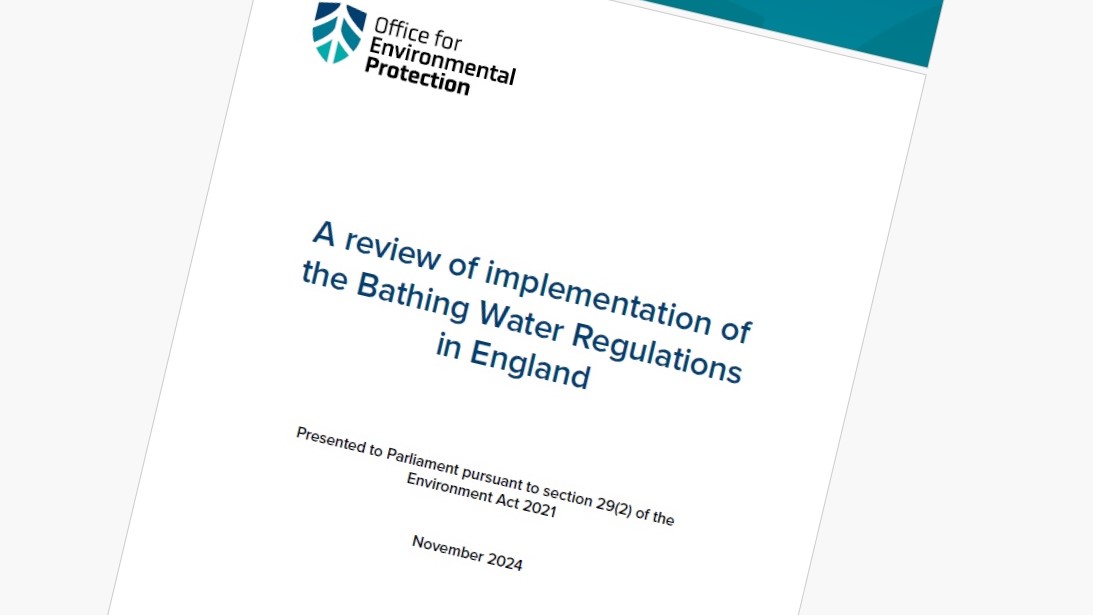The regulations in place to protect people swimming in rivers, lakes and coastal waters in England could better protect the public if they were updated, a report by the Office for Environmental Protection has concluded.
While the report finds that the regulatory regime in place is being followed but it is outdated as the regulatory requirements have not kept pace with the changing ways in which society uses rivers, lakes and coastal waters for recreation.
A Review of Implementation of Bathing Water Regulations in England, published on Thursday, 14 November, says that the regulations focus on swimming, and any future review should consider expanding that to include surfers, paddle-boarders, wind-surfers and the like. The regulations also focus on a fixed ‘bathing season’, which does not reflect the year-round nature of the activities.
Any review should also consider the approach to sampling water quality, with a view to making sure that the locations and number of sampling points provides a representative assessment of the health risks, particularly at larger sites, says the report. Ways of improving communication to the public using the sites should also be considered.
In a separate and recent report on a related topic, the implementation of the Water Framework Directive regulations, the OEP identified a lack of specific, local plans for individual water bodies was a barrier to setting and achieving effective environmental objectives. Bathing water sites are ‘protected areas’ under the WFD regulations, and this latest report finds the same issue is relevant to them.
Dame Glenys Stacey, Chair of the OEP, said:

“We have found the current Bathing Water Regulations out of step with the needs of today. They originate from developments in the 1970s and 1980s and have not kept pace with the evolving ways in which waters are now used for recreational purposes, or with public expectations.
“It is fair to say that the regulations have led to significant improvements in bathing water quality since they were introduced around three decades ago, and we can see that important elements of the regulations – monitoring, classification and reporting requirements – are being implemented.
“But the lack of overall improvement in water quality observed in recent years, combined with an increase in the number of bathing water sites failing to achieve sufficient standards, is a cause for concern and has been widely reported.
“For the public to be better protected, and to enjoy the significant health and wellbeing advantages of being active, closer to nature and more connected to their communities, the regulatory regime needs to be more expansive and more effective.”
The report makes 12 recommendations to Defra and the Environment Agency, including:
- To consider whether wider categories of water users should be taken into account, not just those whose intention is to swim, but also those who would normally or frequently expect to be immersed (such as surfers)
- To review the current identification criteria for bathing waters to ensure it covers sites where large numbers of people bathe, based on a properly representative assessment of current use, rather than a fixed number of bathers or infrastructure.
- To consider options to expand the bathing water season to better match the actual usage of bathing waters by significant numbers of people. This could include considering the possible use of different season lengths at different locations
- Defra and the EA should pursue the further development of short-term pollution risk forecasting systems so health risks can be better understood and communicated to the public with greater speed, including for inland sites.
- In any review of the Bathing Water Regulations, Defra and the EA should consider the scope and options to update the monitoring and sampling regime. This should include considering the potential to:
- take a more flexible approach to determining the most representative sampling locations
- increase the number of sample points on long stretches of identified areas
- develop proposals for the consistent monitoring of and response to blue-green algae blooms
- provide increased transparency and explanation of monitoring decisions so that people understand what is being done, when, how and why
In implementing the broader Water Framework Directive (WFD) Regulations, Defra and the EA should ensure that:
-
- the objectives set for bathing waters are sufficiently ambitious and recognise the duty to aim for ‘good’ or ‘excellent’ where appropriate
- those objectives are backed up by clear, specific and time-bound measures to achieve them at the level of individual water bodies
- the identification of those measures considers all relevant pressures, including from agriculture and other sources as well as the water industry, and the impacts for the water environment as a whole.
Dame Glenys added:
“Defra has launched a timely consultation on the Bathing Waters Regulations that covers a lot of the issues identified in our report. We hope that our report is a useful and valuable contribution to that consultation exercise, and that Defra consider carefully all of our recommendations.
“We now await Government’s response to the report, which must be laid before Parliament within three months.”



